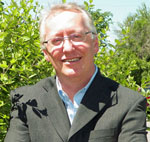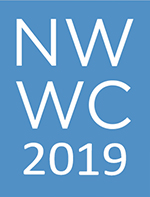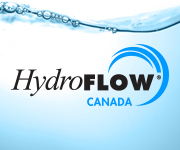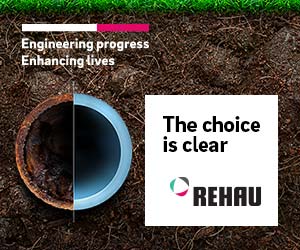 |
||||||||||||
| Subscribe | Past Issues | www.cwwa.ca | Water Source Magazine | ||||||||||||
|
CWWA News
My apologies for not offering a full Water Haller this month. We’re right in the middle of conference time and I mid-travel between the BCWWA conference in Banff and the Canadian Water Summit in Blue Mountain before I make it to the Window on Ottawa….then comes AWWA’s ACE in Denver….and then more.
This will be the fifth in our National Water and Wastewater Conference series. Merging all aspects of water management - from wastewater to drinking water to water and wastewater research to utility and infrastructure challenges, this event is a truly unique event that fosters national dialogue on the most important national water issues.
A joint research project on climate change involving Public Sector Digest (PSD), CWWA Canadian Water Network and the Federation of Canadian Municipalities is in its final stages and the resulting product will be available soon. The joint project builds on the previous collaboration between the parties where they researched what asset data is being collected by Canadian municipalities and how it is being used to support water infrastructure planning. The latest collaboration is again about data but is focused on climate change vulnerability. The research project intends to present a number of case studies to show ways in which better data has been used to identify climate change related vulnerabilities in communities across Canada. Member News
The Canadian Standards Association has posted a proposed draft National Standard of Canada on Flood Resilient Design of New Residential Communities for Public Review. The Public Review Period will be open until June 30, 2019. This standard outlines requirements and recommendations for greenfield developments. It includes general principles of community level design, planning principles, siting and stormwater system elements focused on building resilience against flooding into the design of new communities. The American Water Works Association (AWWA) recently testified before the U.S. House Subcommittee on the Environment and Climate Change about approaches to addressing PFAS in drinking water. RES’EAU Water Net was formed as Canadian Cenre for Excellence. It was formed as a research initiative that brings together water technology engineers, chemists, economists, science policy experts and industry partners to tackle water treatment issues. Their hands-on, inclusive approach brings communities directly into the process of designing a passive water treatment plan that delivers the best results at the lowest costs. AWWA Utility Insiders AWWA, the National Association of Clean Water Agencies and Water Environment Federation together produced a report that suggests a new approach for assessing community and household affordability for water services. Federal Initiatives
On May 1, 2019, the Canadian Environmental Assessment Agency released background documents on the proposed new Impact Assessment Act, Bill C-69. The documents include references to past consultation papers dealing with the government’s proposals to revise the Project List and Information Requirements and Time Management Regulations. Although that round of consultations is now closed, the government notes that another round of consultations on the regulatory proposals is being scheduled for the Fall. On April 9, 2019, the Minister of Environment and Climate Change, Catherine McKenna, announced the winning bid to create the new and independent climate institute, by the Pan-Canadian Expert Collaboration. The primary objectives of the Regulations Amending the Transportation of Dangerous Goods Regulations (Emergency Response Assistance Plan) are to address the recommendations of the Emergency Response Task Force (ERTF) to improve the ERAP program and enhance public safety in the event of an incident during the transportation of dangerous goods. The amendments will: The CAF will provide up to $3 million in grants and contributions for projects that raise awareness of climate change and build capacity in order to increase climate actions that contribute to Canada’s clean growth and climate change plan. Students, youth, Indigenous Peoples and organizations, small- and medium-sized enterprises, college and universities, and not-for-profit organizations are eligible to apply. Provincial News
On March 29, Nova Scotia’s Environment Minister released a decision that demands more detailed information about 19 elements of Northern Pulp’s pending environmental assessment for a proposed effluent treatment plant and a controversial underwater discharge pipeline in Pictou County. Environment Minister Margaret Miller noted that her department will soon publish terms of reference for a newly-required focus report and post them on the department website. Paper Excellence Canada, the management team for Northern Pulp, will then have up to one year to submit the follow-up report on the project, which centres on a replacement effluent treatment facility. Six northern non-governmental organizations have launched a website in response to what spokesperson Karen Hamre describes as an "unprecedented volume" of environmental legislation slated to become law during this summer''s sitting of the NWT Legislative Assembly. The government of Northwest Territories is introducing or amending nine pieces of legislation related to the environment and industry. The sweeping legislation will govern forests, industry, protected areas, environmental rights, financial securities and carbon pricing. The legislation is meant to replace federal legislation inherited through territorial devolution in 2014. Several proposed bills are touring NWT communities in May as part of the public hearing process and 120 day review period. On April 1, 2019, the Government released its Climate Resilience in Saskatchewan 2019 Report. The Report provides the status and the target for each of the framework's 25 measures. Snippings & Clippings
Water Online A maintenance check turned surprisingly grim last week at a Birmingham Water Works facility in Alabama. WaterWorth What is the future for consulting now that we have software that lets people do rates analysis themselves with ease and confidence? Are rate consultants tomorrow’s steam train engineers, fighting it out in a sunset industry? I actually think consultants will continue to have an important role — but the game will change dramatically over the next decade. Water Innovations As PFAS and a host of other pollutants threaten water systems and erode public confidence, the water industry fights back with a comprehensive action plan. CBC News Floodwaters in Fredericton are finally receding, but they're leaving behind traces of some of the strange things people flush down the toilet. High water overwhelmed Fredericton's sewer system, causing manholes in some low-lying neighbourhoods to overflow and spill onto the streets and people's property. CBC News The regional government of Canada's third-largest metropolitan area has launched a video campaign introducing mascots Poo and Pee to drive home a message about improper flushing. The costumed mascots are part of Metro Vancouver's annual Unflushables campaign to remind people about items that should not be flushed because they can clog city sewers and your pipes. |
||||||||||||







